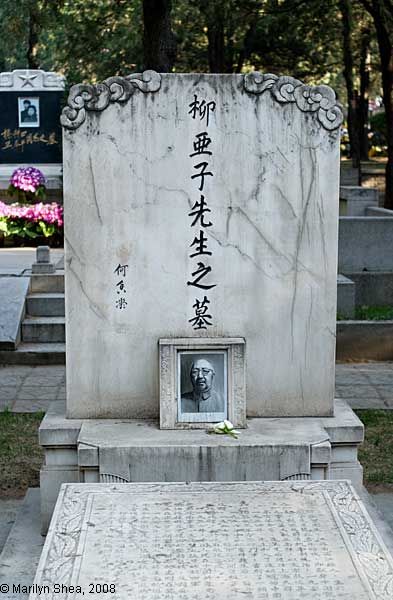 |
Liu Yazi 柳亚子 (Liǔ Yàzǐ 1887- 1958) was born in Lili Town, Wujiang, Jiangsu Province. His family was educated and saw to it that he received a classical education, especially in poetry. His father was a supporter of the reform movement in the late Qing Dynasty, and influenced his son to be politically active. In 1903, Liu Yazi went to Shanghai to study and was exposed to the many currents of revolution circling through the literary and political world. He joined several societies and started Nanshe, a group of writers and poets who discussed change and evolution in both the literary and political world.
Liu Yazi was both a historian and a poet. His poetry has roots in the Tang and Song ancients, but breaks out of the mold to become politically and socially active. It was through his poetry and essays that he supported the revolution. One of his early poems from 1912 was written for a friend leaving for Japan. An English translation is available HERE. While in Shanghai during those early years, he met Sun Yatsen on a ferry. Through their conversation he became a lifelong supporter. He joined the movement and in 1911 at the time of the revolution Sun Yatsen asked him to join the government as his presidential secretary. Liu Yazi accepted but then resigned after three days. One would imagine that his organizational skills were up to the task, but that the politics of such an office might not suit the temperament of the scholar. He continued to support Sun Yatsen's thought and politics through his life, contributing both poems and essays to support the "Three Principles" - nationalism, democracy, and the people's livelihood. Liu Yazi remained an active member of the Guomindang and became the curator and director of the Shanghai Annals - a repository of historical documents. In 1927, he found it wise to go to Japan to avoid the "purge" of leftist elements of the Guomindang begun by Chiang Kai-shek. He returned to Shanghai in 1928. In 1935, he was one of the first supporters of the August 1st proclamation of the CCP Central Committee, calling on all Chinese to end the civil war and fight the Japanese. During the late 1930's he became highly critical of the policies of the Guomindang. He and Song Qingling, Sun Yat-sen's widow, joined forces in Hong Kong during the Anti-Japanese war and were vocal in their critiques of the Guomindang. Liu Yazi was kicked out of the party in 1941. He joined the CPC in 1944. Around that time he met Mao Zedong and had a famous exchange of poetry with Mao. He had sent poems to Mao, and in return, Mao sent him "Reply to Mr. Liu Yazi", the link will take you to an English translation of Mao's poem. Mao and Liu exchanged poems on several occasions. Washing Sands in the Brook
--From: Mao Zedong as poet and revolutionary leader Mao used classical references to compare Liu to an ancient scholar who criticized his king, and compared the ignoble king to Chiang Kai-shek. The poem goes a long way to explain the regard with which Liu Yazi was held. In 1949, Mao Zedong summoned him to Beijing from Hong Kong and later that year he was elected to a place in the Central Government at the same time that Mao was elected chairman. Liu Yazi continued to write both history and poetry until his death in 1958. |
http://hua.umf.maine.edu/China/Babaoshan/index.html
Last
update: July 2009
© Marilyn Shea, 2009